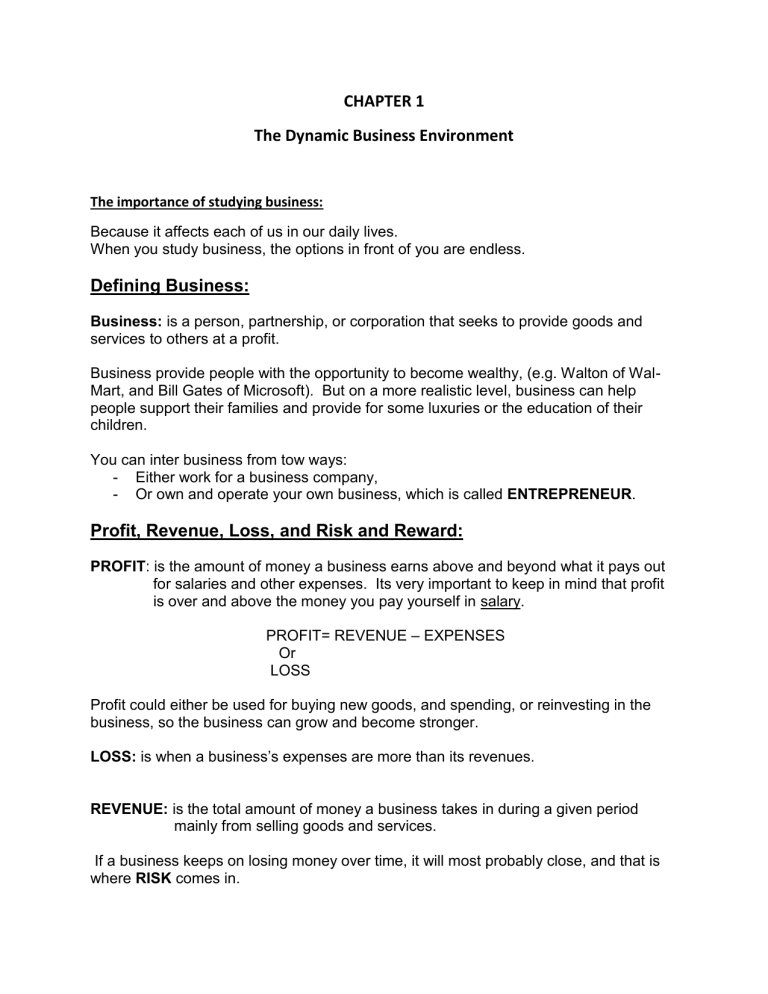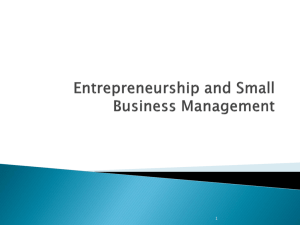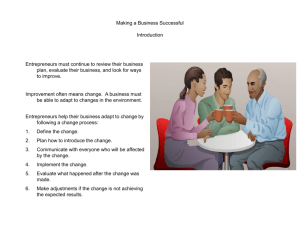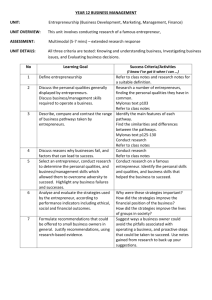Chapter1

CHAPTER 1
The Dynamic Business Environment
The importance of studying business:
Because it affects each of us in our daily lives.
When you study business, the options in front of you are endless.
Defining Business:
Business: is a person, partnership, or corporation that seeks to provide goods and services to others at a profit.
Business provide people with the opportunity to become wealthy, (e.g. Walton of Wal-
Mart, and Bill Gates of Microsoft). But on a more realistic level, business can help people support their families and provide for some luxuries or the education of their children.
You can inter business from tow ways:
- Either work for a business company,
- Or own and operate your own business, which is called ENTREPRENEUR .
Profit, Revenue, Loss, and Risk and Reward:
PROFIT : is the amount of money a business earns above and beyond what it pays out
for salaries and other expenses. Its very important to keep in mind that profit
is over and above the money you pay yourself in salary.
PROFIT= REVENUE
– EXPENSES
Or
LOSS
Profit could either be used for buying new goods, and spending, or reinvesting in the business, so the business can grow and become stronger.
LOSS: is when a business’s expenses are more than its revenues.
REVENUE: is the total amount of money a business takes in during a given period
mainly from selling goods and services.
If a business keeps on losing money over time, it will most probably close, and that is where RISK comes in.
Risk-taking is the critical element for improving the STANDARD OF LIVING.
STANDARD OF LIVING: is the quality and quantity of products available to people and
how these goods are distributed over the population.
RISK: is the chance an individual or organization takes of losing TIME and MONEY and
ENERGY on a business that may not prove profitable.
Profit making is not equal, some companies might make more profits than others. Its notices that companies that take the most risk may make the most profit.
Different people have different tolerance for risk. In order to decide the best choice for you, you have to calculate the RISK and the potential REWARDS of each decision. The more risk you take, the higher the rewards may be. So before taking any decision, or action, ask around, do some research to find the right balance between risk and profit that suits you.
Stakeholders and Shareholders:
Every shareholder must be a stakeholder, but not every stakeholder is a shareholder.
STAKEHOLDER: are all the people who stand to gain or lose from the policies and activities of a business. They include customers, employees, stockholders, suppliers, bankers who made loans to a business, people in general in the surrounding community, and elected government leaders, and others.( see figure1.1 page7).
All of these groups are affected by the products, policies, and practices of businesses, and their concerns need to be addressed.
The challenge for organizations is to balance, as much as possible, the needs of all stakeholders. So business leaders must make decisions based on all factors, including the need to make a profit. Pleasing all stakeholders is not easy and calls for trade-offs that are not always pleasing to one or another syakeholder.
SHAREHOLDER: is a person who actually owns stock in a company.
STOCK: is an intangible piece of ownership in a company.
When a person owns a stock, he actually owns a piece of the company, however small the piece might be.
Shareholders want to see return on their investments, and as a result, businesspeople are constantly under pressure to satisfy the needs of the stakeholders, including its shareholders.
Progress in the Service Industries:
SERVICES: are intangible products( products that can’t be held in your hands) such as
education, health care, insurance, recreation, and travel and tourism.
In the past, the dominant industries produces goods, today the leading firms are service, such as legal, health, telecommunication, entertainment, and financial industries.( see figure 1.2 page 12).
The service sector is considered to be the largest fastest growing sector, and there are more high-paying jobs in the service sector than in the goods-producing sector.
The Five Parts of the Business Environment:
The business environment consists of the surrounding factors that either help or hinder the development of business, which are:
1-
2-
3-
4-
The economic and legal environment
The technological environment
The competitive environment
The social environment
The global environment
5-
Every business owner must be aware of these environments if he/she wants to succeed. They can do so by reading the newspapers, and various business publications to monitor the changes in each environment, that way they can constantly be up to date on changes and can adjust their business accordingly. The business owners need to be aware of stakeholders in each of the business environments.
1- The economic and legal environment:
All businesses work within a framework of laws and economic forces.
People are willing to start a new business if they believe that the risk of losing their money is not too great.
Part of the entrepreneurs’ risk involves the economic system and how government works with or against businesses.
Governments can do a lot to lessen the risk of starting businesses and thus increase entrepreneurship and wealth.(e.g. keeping taxes at a minimum)
All entrepreneur is looking for an acceptable RETURN ON INVESTMENT (ROI).
ROI: is the money gained from taking a business venture risk. In addition to money,
investment of time is also an important consideration for businesspeople.
Countries with high taxes and restrictive regulations tend to drive out entrepreneurs, while countries with low taxes and less restrictive regulations attract entrepreneurs. a- What can government do?:
Ways that the government can actively promote entrepreneurship include:
Allowing private ownership of businesses (some governments are even selling government owned companies to the private sector)
Minimize the interference with the free exchange of goods and services
Pass laws that enable businesspeople to write contracts that are enforceable in court,
Establish a currency that is tradable in world markets.
Tradable currency: is money that is allowed to be exchanged for another country’s money.
Must help minimize corruption in business and in their own ranks.
Corruption can be found not only in large companies but in small businesses as well, and its important to takl it in both. investing in stocks(i.e. becoming owners in these corporations).
Board of directors : is a group of people that oversee the activities of a corporation, it is generally a mix of a small number of company executives and a greater number of outsiders.( because they oversee the whole corporation, it is a very serious problem if they get involved in unethical behavior).
The capitalist system : is one in which the companies and businesses are owned by the citizens instead of the government.
The capitalist system relies heavily on honesty, integrity, and high ethical standards, and failure to adhere to those fundamental standards can weaken the whole economical system.
2- The Technological Environment:
People creat tools all the time to make their life easier.
Business have always been affected and even transformed by technological development.
The biggest technological development which had the strongest, and most lasting impact on business was the emergence of INFORMATION TECHNOLOGY (IT), (i.e. computers, modems, the internet, cell phones, and so on).
The internet is the IT with most affect. a- Increased productivity:
Technology:
is everything from phones and computers, to medical imaging devices, personal digital assistants, and the various software programs that make business processes more EFFECTVE, EFFICIENT, and PRODUCTIVE.
Effectiveness:
is producing the desired results.
Efficiency:
is producing goods using the least amount of resources. (Resource: is something used in the production of goods)
Productivity:
is the amount of output you generate given the amount of input (e.g. if the input is hours worked, so the more you can produce in any given period of time, the more money you are worth to companies. Technology has greatly improved productivity.
One reason that workers in developed countries make more money than in most other developing countries is that they have access to technology that allows them to be more productive. b- Making Buying and Selling Easier:
e- commerce:
is the buying and selling of goods over the Internet.
There are two types of e-commerce transaction:
Business-to-consumer (B2C)
Business-to-business (B2B)
B2B e-commerce is already at least five times as big as B2C e-commerce.
Just like in traditional businesses, some e-commerce businesses will fail and some will succeed. Success will come to those e-commerce businesses that offer quality products at good prices with great service. c- Responsiveness to Customers:
Most companies succeed or fail largely because of the way they treat their customers.
One way traditional retailers can respond to the internet revolution is to use technology to reach customers. (e.g. businesses mark goods with Uniform Product Codes or
UPCs bar codes, which are the series of lines and numbers that you see on most consumer packaged goods. These bar codes can be used to tell retailers what product you bought, in what size and color, and what price. A scanner at the checkout counter reads that information and puts it into a DATABASE.
Database:
is an electronic storage file where information is kept,
Some retail shops offer “preferred customer” cards that can be scanned at checkout.
The customer contact information and purchase history then become part of the retailer’s database, then the database is traded between other retailers, so they would get your information.
The use of databases enables stores to carry only the merchandises that the local population wants, and thus to maintain a smaller inventory, which saves them money.
3- The Competitive Environment:
Competition among businesses has always existed, and it is stronger today than ever.
Some companies try to compete by focusing on QUALITY.
But these days focusing on producing high qua lity products isn’t enough to allow a company to stay competitive in world markets. Companies now have to offer both high quality products and outstanding service at competitive prices - this is what it means to offer customers value . a- Customer-Driven Organizations:
Customers require both high quality and high value , so if companies want to stay competitive they must offer both.
Big businesses and small businesses depend on their returning customers and as result, should go out of their way to make customers feel as if they are number one by doing things such as: * letting customers make their own product (e.g. make-up your
own pizza, or your own teddy bear)
Keeping the place clean and organized
Having a generous return policy
Speedy delivery, plus good quality and reasonable prices
Successful organizations must now listen more closely to customers to determine their wants and needs, then adjust the firm’s products, policies, and practices to meet those demands. b- Employee Empowerment:
To meet the needs of the customers, firms must give their frontline workers the:
Responsibility
Authority
Freedom
Training
Equipment that they need to respond quickly to customer requests and make other decisions essential to producing quality goods and providing good services, this is called
EMPOWERMENT.
To empower employees, the managers must train frontline people to make decisions without the need to consult managers.
To help employees become more effective, some companies formed CROSS-
FUNCTIONAL teams.
Cross-functional teams : are teams made up of people from various departments- to
work on a special project. Theses teams often work without
close supervision; thus they are sometimes called SELF
-MANAGED cross-functional teams.
Companies that implemented empowerment was known to eliminate managers and redistribute workloads on lower level workers, so these companies with self-managed teams expect a lot more from their lower-level workers than they did in the past and can do without various levels of managers.
Lower level workers these days need to be more educated and need to be treated as partners in the firm as more and more is expected from them.
4-
The Social Environment:
All the world is going through big social changes affecting how people live, where they live, what they buy, and how they spend their time. In order for business people to better understand the needs of people and be able to meet them, they must be always aware of these social changes. a- Diversity:
Diversity: is the broad differences between people (ethnicity, gender, color, sexual
orientation, body size, age).
Businesses are concerned about having a diverse workforce for two reasons:
A business can better serve customers form different background
They bring about new, fresh ideas and perspectives.
The management of diverse groups whether they are different because of race, sex, age, sexual orientation, country of origin, religion, or some other classification can be
difficult. It becomes even more difficult as managers go overseas and must respond to cultural, political and social issues that are specific to each country. b- Aging Consumers:
A social issue and concern is the fact that Baby Boomers (i.e. people born between
1946 and 1964) are growing older, and as they retire, there will be more jobs than people qualified to fill those jobs.
By 2030, the baby boomers will be senior citizens, and they are considered the richest segment of the population, so their spending will shift from spending on restaurants, transportation, entertainment, education, and traveling to medication, nursing homes, assisted-living facilities, adult day care, home health care and recreation.
Successful businesses should be aware of this shift and be prepared to take advantage of it, by better understanding the wants and needs of consumers, so they will be able to better provide products to meet those needs. c- Dual Incomes:
Dual income family is one in which both adult members of the household work.
Several factors have led to a dramatic growth in two-income families:
the high cost of housing
the high cost of maintaining a comfortable lifestyle
the high level of taxes
the cultural emphasis on “having it all”
some parents simply want a career outside the household
Companies have developed several programs to meet this trend such as:
employees pregnancy benefits
parental leave
flexible work schedules
elder care programs
internal children day-care
offering part time workers, to enable mothers and fathers to stay home part of the day with children and still earn income
some companies allow workers to telecommute, which lowers the company’s cost for office space and also makes it possible for parents to meet the demands of both job and family
d- Single Parents:
This trend which is increasing in the western countries, have encouraged businesses to implement programs such as:
family leave (where workers can take time off to care for a sick child)
flextime (where workers can come in or leave at selected times) e- Marriage:
In the past individuals get married and have children at an early age, this view has changed now days.
People get married much later if at all, and have children much later if at all. As a result unmarried people need products to meet the need of a single lifestyle, and they would have more money to spend than couples in the past.
5- The Global Environment:
The global environment is very important as it surround all other environment influences.
Two important environmental changes in recent years have been:
1- the growth of the international competition
2- the increase of free trade among nations: which is the reduction of barriers to trade, such as elimination of tariffs (or taxes) on goods brought into another country
Some businesses have gone beyond simply competing with organizations in other countries by learning to cooperate with international firms.
This cooperation among businesses has the potential to create rapidly growing world markets that can generate prospe rity beyond most people’s expectations.
Global competition is not only among large companies, but rather among even medium and small size companies that sell their products over seas.
YOUR FUTURE IN BUSINESS
As you embark on your career in business, you have several choices:
you can either start your own business
you can work for someone else-} could be a large or small business
a nonprofit organization
a government agency
ENTREPRENEURSHIP VERSUS WORKING FOR OTHERS:
There are mainly two ways to succeed in a business:
work for others, get experience and skills, and rise up through the ranks
(in this case someone else is assuming the entrepreneurial risks and paying your salary and benefits)
work for your self that is start your own business which is more riskier
As an entrepreneur, you are not paid vacations and sick leaves that you may receive when working for someone else. You have to provide these benefits for yourself.
Many entrepreneurs started small and grew their business and became very wealthy through hard work and the application of sound business principles.
Working for others:
As you all might know that the earning power of a college graduate far outpaces that of less-educated individuals.
If you are looking for growth and advancement with potential to move higher, the choice of company to work for may be medium-sized to large firm. However if you are looking for a job diversity, flexibility, and the chance to develop a broad set of skills, the choice may be to work for a small, entrepreneurial firm where the size of the firm may allow employees a lot of variety and latitude in decision making.
Once you have the experience, either working for large or small firm, you will have the ability and the opportunity, if that is your desire, to start your own business.
Entrepreneurial Challenge:
Many young people these days try to make it on their own, by starting their own business.
Entrepreneurship is also an attractive career path for an increasing number of women.
Creation of Wealth:
Because of the factors of production we can find countries that are relatively wealthy and others that are poor.
FACTORS OF PRODUCTION: they are five factors that contribute to wealth, they are:
Land: land and other natural resources that are used to make homes, cars, and other products.
Labor: they are people who are involved in producing goods and services, they are considered the most important factor even though they are being replaced by technology.
Capital: includes machines, tools, buildings, and other means of manufacturing.
Entrepreneurship: all the resources in the world have little value unless entrepreneurs are willing to take the risk of starting businesses to use those resources.
Knowledge: Information technology which has revolutionized business, making it possible to quickly determine wants and needs to respond with desired goods and services.
its not land, nor labor nor capital that are the element for wealth creation. Its rather the combination of entrepreneurship and the effective use of knowledge.
Working for a Nonprofit Organization or Government Agency :
A nonprofit organization : is an organization whose goals do not include making a personal profit for its owners or organizers, even though they might strive for financial gains, but such gains are used to meet the stated social or educational goals of the organization.
Social Entrepreneurs : are people who use business principals to start and manage organizations that are not for profit and help alleviate social problems.
Government Agency : is an organization accountable for overseeing explicit government functions.(e lectricity and water authority “EWA” , General organization for social insurance “GOSI” , Labor fund “TAMKEEN”)
If you want to work for a non-profit making organization or for a government agency, does not mean you should not study business, on the contrary, you should because the business concepts and principles that make businesses more effective and efficient are applicable in government agencies and nonprofit organizations as well.





